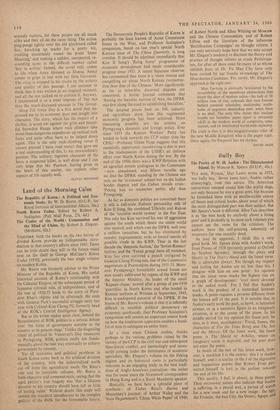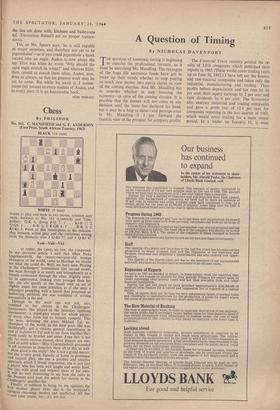Bully Boy
'FLY west, Wystan,' Day Lewis wrote in 1933, 'my bully boy.' Seven years later, Auden, rather dismayingly, took this advice. The American universities romped round him like joyful dogs, not only because he was a great poet, but because he furnished them with an inexhaustible source of theses and critical books, about most of which the most distinguished part was their subject. But Mr. Spears's book is different. Allen Tate describes it as 'the best book by anybody about a living poet' and it probably is. In most such volumes you cannot see the verse for the criticism. The authors have the self-praising solemnity of mourners for one recently dead.
As may be apparent, I think this a very good book. Mr. Spears deals with Auden's work, from Poems of 1928 (privately printed at Oxford by Stephen Spender), through the plays and libretti to The Dyer's //and and the latest verse. He is admirable always. Yet though my respect and feeling for Auden are no less than his, I disagree with him on one point : his opinion that the latest verse marks the highest rise on a graph of development : 'ever more devoted to the naked truth.' For I feel that Auden's work is the product of a watershed between masks. A poem requires a persona different from the human self of the poet. It is notable that in Auden's early work the poet, as hawk, as helmeted airman, or as a nameless figure in an imaginary situation, is at the centre of the poem. In his middle period (in my opinion his finest yet), he uses, as it were, mouthpieces: Freud, James, the characters of For the Time Being and The Sea and the Mirror. Of the latest work, the finest poem is The Shield of Achilles, where an imaginary scene is depicted, and the poet does not enter the poem.
In much of the rest of this latest work, how- ever, a maskless / is the centre : this / is Auden himself, and it is similar to the I of the digressive and loquacious poems that Robert Frost per- mitted himself to knit in the parlour towards the end of his life.
This quality, I feel, is absent, in these pieces. Their occasional nature also indicate that Auden is suffering, in a placid way, a period of search for a new mask and for a new image : the SPY, the Frontier, the Just City, the Desert, Agape, and
the Sea are done with; kitchens and bathrooms (cf. 'Encomium Balnei') are no proper replace- ments.
Yet, as Mr. Spears says, 'he is still capable of major surprises, and therefore not yet to be pigeonholed'—as if you could pigeonhole a hawk turned into an eagle. Auden is now about the age Eliot was when he wrote 'Why should the aged eagle stretch its wings?' and whereas Eliot, then, ceased to stretch them often, Auden, now, does so always, so that his greatest work may be yet to come. But while we await it, I recom- mend this volume to every student of Auden, and to every poet. It is an honourable book.
DOM MORASS



































 Previous page
Previous page